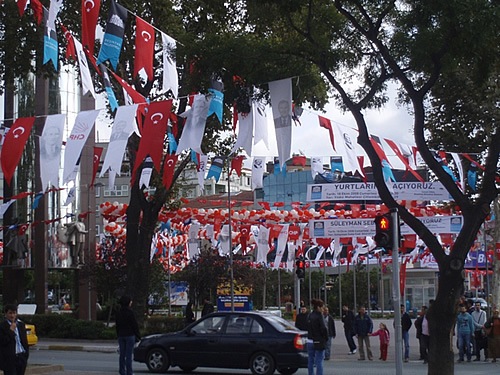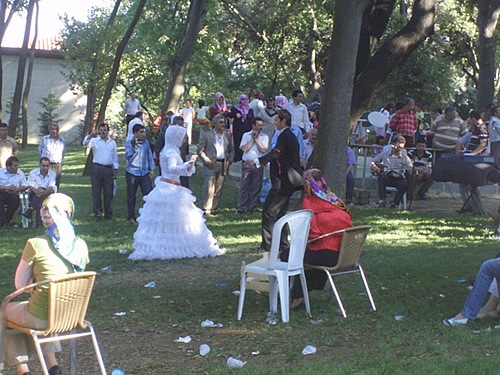Living and Working In Istanbul
A Tale of Two Cities
Article and photographs by Jo Knights
Istanbul: City of Contrasts
Taking the 10-minute ferry ride from Europe to Asia never ceases to thrill. Istanbul enjoys a unique geographical position straddling two continents, and even though I have lived here for over a year, I still cannot make that crossing without a childlike sense of excitement. And yet, thousands of inhabitants of Istanbul make this crossing daily, as a matter of routine, leaving their homes in Asia and heading to work in one of the many banks in the modern business district of Levent, a bar or restaurant in central Beyoglu, or perhaps in one of the inevitable carpet shops in the historic and touristic quarter of Sultanahmet. As the boat turns and begins its brief journey across the Bosphorus, the domes and minarets of the city's historical center swing into view. The swarthy men sitting opposite me on the benches that line the deck dig their hands deep into their jacket pockets and stare out over the waters, all of us silent in our contemplation of the fusion of past and present.
Many things about Istanbul continue to surprise me with their beauty, constantly affirming my decision to come and teach here for a year or two. What initially attracted me was the lure of the exotic--differences in culture, language, and religion. But I was also to find much that was familiar, and this mixture defines Istanbul. Istanbul is indeed a city of two halves, not just in the geographical sense. In fact, there is no neat separation of the "two cities"; instead, they are mixed up in one joyful boiling pot. Contrasts are everywhere... an orthodox church nestling in the same street as a mosque; a man atop a horse and cart negotiates his way amidst the traffic jams; older men sitting and playing backgammon in tea houses, while modern business women in short skirts sip their Starbucks coffee; families shop in huge, fashionable, glass-fronted shopping malls, while others barter for goods beautifully displayed in old bazaars; small fishing boats jostle for position amongst luxury yachts; the poor live in dilapidated housing while the elite sits on the balconies of their mansions overlooking the Bosphorus.
Adapting to Life and Work in Istanbul
Turkey as a country is moving forward at an astounding rate. Often criticized for being far behind the times in politics and social attitudes, it has changed in less than a century. Yet most people I meet here have a genuinely entrenched sense of tradition and pride in their history and culture. Their penal code makes it illegal to insult Turkishness and devotion to the state is fostered at an early age. There is a primary school just behind the block of flats where I live, where the obligatory statue of the much revered Ataturk, founder of the modern republic, stands in the playground, watching over the children as they sing the national anthem every morning.
The very intense patriotism and history of authoritarianism sit a little uncomfortably with my modern sensibilities. The city seems to be decked in the strikingly simple red flag with a white crescent and star at every opportunity: Republic Day, an election, Ataturk's birthday, death... the list goes on. But pride extends beyond flag-waving and military parades. It is a pride in Turkey itself. According to most of my students, this country offers the best beaches, the most delicious food, the most interesting historical ruins and archaeological sites, and the warmest and friendliest people in the world! I agree with them. However, these lofty claims are slightly offset by the fact that few know other cultures and countries, with fewer still having ever visited another country. I once introduced a lesson featuring an article about Australia by asking students what they knew about the country. To my surprise, my question was met with a resounding silence.

|
Intrinsic to Turkish culture is the notion of marriage and the family. If you are a single woman or even a single man, you should prepare yourself for a grilling! I now have my stock of ready answers when meeting someone new. Turkish people are fascinated by foreigners and do not shrink from asking personal questions, which we might find a little intrusive. In class, I have often been asked questions such as "How much do you earn?" "Are you married?" and the inevitable next question, "Why not?" But in Turkish culture, they are merely showing their interest. They pride themselves in their warmth and hospitality. In my first week at the language school, a group of elementary-level students overcame their tenuous grasp of English to invite me to spend the day with them the following Sunday, their only day off and a day usually reserved for family. They gathered from all corners of Istanbul and insisted on taking me up the Bosphorus to a beautiful fish restaurant, refusing to let me pay for anything all day. I have experienced nothing but genuine kindness and helpfulness from most people here. If you are lost, they will take you there rather than give you directions. If they do not know the way, they will ask everyone around them until they do!
Being a Woman in a Muslim Country
As we make our way back to the European shore, our way is lit by the rainbow-colored lights of the Bosphorus Bridge. I am amazed we do not collide with the other boats that ply these straits, some of them huge tankers from the Black Sea, but we never do. I have just spent the evening with my friend Seyda. Like many Turkish women, she is pretty and petite, her eyes sparkle playfully, and she never stops laughing. She lives with her mother and probably will do so until she is married. She is ambitious, is studying to be an accountant, learns salsa in her free time, and yearns to travel abroad. Many women like Seyda are here, sensible of their culture and traditions but modern and independent in their outlook. When I first told friends I was coming to Istanbul to teach, one of them asked me whether I would have to wear a headscarf. Turkey is, of course, a predominantly Muslim country, but it is also a secular state. In its major cities, many women do not cover their heads. Even though it is true that more covered women can be found the further east you go, I have seen women both covered and uncovered living side by side in all regions of Turkey. As a secular country, however, wearing the headscarf in public places is controversial. I spent time teaching at a university here. I witnessed several covered students hastily removing scarves and donning rather unbecoming wigs before entering the gates. Seyda supports the banning of headscarves in universities. She fears a time when women will be forced to cover themselves again, just as in the past, just as in Iran.

|
Grappling with the Turkish Language
I came to know Seyda initially as a conversation exchange partner. Learning this language has proved even more challenging than I had anticipated. Many of my fellow teachers have barely even managed everyday greetings. It has taken much determination to develop a reasonable level of conversational Turkish, achieved through many afternoons in cafes and tea houses with my grammar book and workbooks, holding stilted conversations in my emerging Turkish with the friendly waiters and waitresses. But one of the difficulties in the early stages is that Turkish people want the chance to use and show off their English! So many times, I tried my best to express myself in faltering Turkish, only to be roundly knocked back with an ungrammatical but swift and cheerful response in English! After taking some lessons in my school's Turkish department, it became essential to have a language exchange partner to put it all into practice. This involves meeting for a couple of hours, talking for half the time in one language and half in the other. This proves an easy, pleasurable, and cheap way to increase my confidence and meet new people!
Arriving back in Besiktas, the call to prayer cuts through the evening air and reminds me of what brought me to this city. The exotic and the familiar, the traditional and the modern intertwine as the muezzin's cry fades and the strains of Turkish pop begin to pulsate.
Useful Resource to Ease Your
Transition to Istanbul
Turkey Travel Planner is hosted by long-time expert Tom Brosnahan, who is also the author of a book about Turkey called "Bright Sun and Strong Tea," and formerly the author of guidebooks on Turkey. The website is a fantastic resource when traveling around the country, finding recommended hotels, learning how to get to destinations, etc.
|
Jo Knights lived and worked in Istanbul
for 18 months.
|
